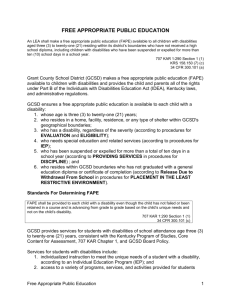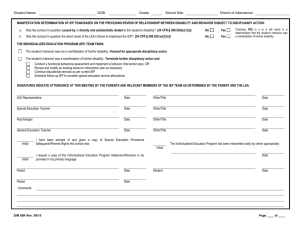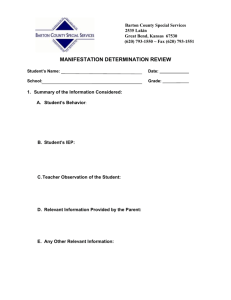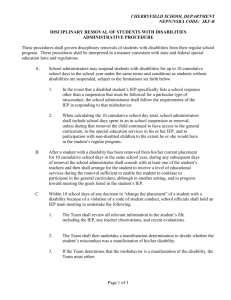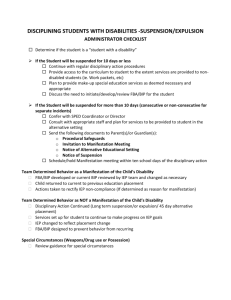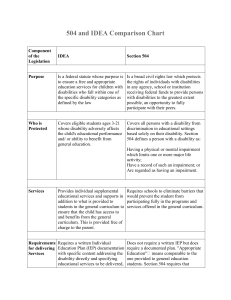Discipline Procedures - Grant County Schools
advertisement
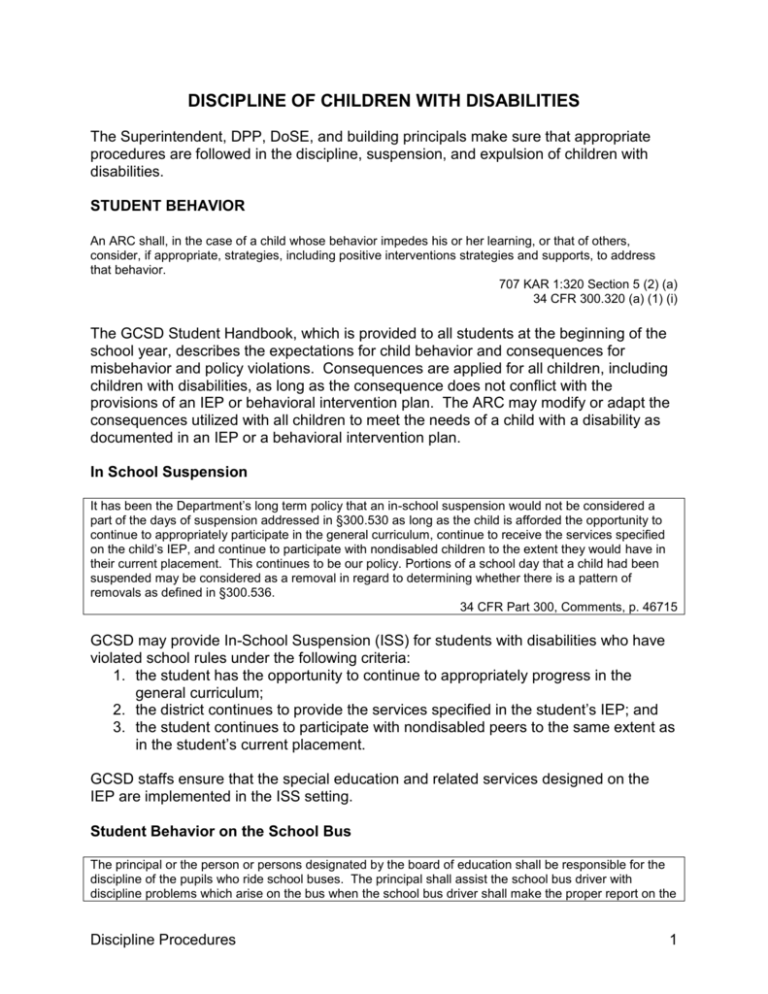
DISCIPLINE OF CHILDREN WITH DISABILITIES The Superintendent, DPP, DoSE, and building principals make sure that appropriate procedures are followed in the discipline, suspension, and expulsion of children with disabilities. STUDENT BEHAVIOR An ARC shall, in the case of a child whose behavior impedes his or her learning, or that of others, consider, if appropriate, strategies, including positive interventions strategies and supports, to address that behavior. 707 KAR 1:320 Section 5 (2) (a) 34 CFR 300.320 (a) (1) (i) The GCSD Student Handbook, which is provided to all students at the beginning of the school year, describes the expectations for child behavior and consequences for misbehavior and policy violations. Consequences are applied for all children, including children with disabilities, as long as the consequence does not conflict with the provisions of an IEP or behavioral intervention plan. The ARC may modify or adapt the consequences utilized with all children to meet the needs of a child with a disability as documented in an IEP or a behavioral intervention plan. In School Suspension It has been the Department’s long term policy that an in-school suspension would not be considered a part of the days of suspension addressed in §300.530 as long as the child is afforded the opportunity to continue to appropriately participate in the general curriculum, continue to receive the services specified on the child’s IEP, and continue to participate with nondisabled children to the extent they would have in their current placement. This continues to be our policy. Portions of a school day that a child had been suspended may be considered as a removal in regard to determining whether there is a pattern of removals as defined in §300.536. 34 CFR Part 300, Comments, p. 46715 GCSD may provide In-School Suspension (ISS) for students with disabilities who have violated school rules under the following criteria: 1. the student has the opportunity to continue to appropriately progress in the general curriculum; 2. the district continues to provide the services specified in the student’s IEP; and 3. the student continues to participate with nondisabled peers to the same extent as in the student’s current placement. GCSD staffs ensure that the special education and related services designed on the IEP are implemented in the ISS setting. Student Behavior on the School Bus The principal or the person or persons designated by the board of education shall be responsible for the discipline of the pupils who ride school buses. The principal shall assist the school bus driver with discipline problems which arise on the bus when the school bus driver shall make the proper report on the Discipline Procedures 1 discipline problem either in person or in writing. A pupil who creates a serious safety or discipline problem or persists in creating discipline problems on the school bus shall be reported to the principal or person designated by the board to handle bus discipline problems. The principal or person designated by the board shall have the authority to forbid the pupil bus riding privileges until the problem is resolved. A student whose bus riding privileges have been suspended shall not be allowed on the bus again until the driver receives written permission by the principal or his designee. 702 KAR 5:030 (19-20) If a student misbehaves on the school bus, the principal may suspend the student from the bus if: 1. the IEP does not prohibit the suspension; 2. the suspension does not result in a change of placement for the student (see CHANGE IN PLACEMENT FOR DISCIPLINARY REMOVALS); and 3. the behavior has not previously been determined to be a manifestation of the student’s disability (see MANIFESTATION DETERMINATION). Whether a bus suspension would count as a day of suspension would depend on whether the bus transportation is a part of the child’s IEP. If the bus transportation were a part of the child’s IEP, a bus suspension would be treated as a suspension under §300.530 unless the public agency provides the bus service in some other way, because that transportation is necessary for the child to obtain access to the location where services will be delivered. If the bus transportation is not a part of the child’s IEP, a bus suspension is not a suspension under §300.530. In those cases, the child and the child’s parent have the same obligations to get the child to and from school as a nondisabled child who has been suspended from the bus. However, public agencies should consider whether the behavior on the bus is similar to behavior in a classroom that is addressed in an IEP and whether the child’s behavior on the bus should be addressed in the IEP or a behavioral intervention plan for the child. 34 CFR Part 300, Comments, p. 46715 If a student with a disability is suspended from the bus and the IEP specifies transportation as a related service, GCSD makes sure an alternative method of transportation is available. If transportation is not a related service, GCSD is not obligated to arrange for transportation services. REMOVAL FOR 10 SCHOOL DAYS OR LESS DURING A SCHOOL YEAR School personnel may remove a student with a disability who violates a code of student conduct from the student’s placement to an appropriate interim alternative education setting, another setting, or suspension, for not more than ten (10) consecutive school days (to the extent those alternatives are applied to children without disabilities). 707 KAR 1:340 Section 13 (2) 34 CFR 300.530 (b) (1) School personnel may remove a student with a disability from the student’s current placement for additional periods of time of not more than the ten (10) consecutive school days in the same school year for separate incidents of misconduct as long as those removals do not constitute a change in placement because of disciplinary removals. 707 KAR 1:340 Section 13 (3) 34 CFR 300.530 (b) (1) Discipline Procedures 2 Suspension of primary school students shall be considered only in exceptional cases where there are safety issues for the child or others. KRS 158.150 (8) A student with a disability who violates a school or board policy may be suspended from school for the same amount of time as a general education student would be suspended, but may not be suspended more than a total of ten (10) school days per school year. A student with a disability may be suspended for a total of ten (10) school days per school year without invoking any of the other disciplinary requirements, such as manifestation determination, revision of the IEP, or behavior intervention plan. The GCSD Student Handbook outlines the due process procedures for short-term suspensions utilized for all students. GCSD does not hold an ARC meeting when suspensions are utilized as temporary disciplinary measures if the suspension is for a minor infraction and no further disciplinary action is planned. GCSD may hold an ARC meeting at any time if requested by the parent, principal, or other service provider. (a) Day means calendar day unless otherwise indicated as business day or school day; (c) School day means any day, including a partial day, that children are in attendance at school for instructional purposes. The term school day has the same meaning for all children in school, including children with and without disabilities. 34 CFR 300.11 (a) & (c) Any portion of a school day is considered a full day. For suspension purposes, a child suspended at any time of the school day is considered suspended one full day. An LEA shall be required to provide educational services to a child with a disability during periods of removal of ten (10) or less school days in the same school year if it provides services to children without disabilities who are similarly removed. 707 KAR 1:340 Section 13 (8) 34 CFR 300.530 (d) (3) GCSD board policy does not provide services for children with or without disabilities who are suspended for less than ten (10) school days in a school year. After a child with a disability has been removed from the child’s current placement for ten (10) school days in the same school year, educational services as described in 707 KAR 1:340 Section 13 (6) shall be provided during any subsequent days of removal. 707 KAR 1:340 Section 13 (5) 34 CFR 300.530 (a) (2) If a child is suspended more than ten (10) school days in the same school year, GCSD follows for CHANGE IN PLACEMENT FOR DISCIPLINARY REMOVALS. CHANGE IN PLACEMENT FOR DISCIPLINARY REMOVALS Discipline Procedures 3 The ARC may consider any circumstances on a case-by-case basis when determining whether to order a change of placement for a child with a disability who violates a code of student conduct. 707 KAR 1:340 Section 13 (1) 34 CFR 300.530 (a) On the date on which the decision is made to make a removal that constitutes a change of placement of a child with a disability because of a violation of a code of student conduct, the LEA shall notify the parent so that decision, and provide the parents the procedural safeguards notice as contained in 707 KAR 1:340 Section 4. 707 KAR 1:340 Section 14 (6) 34 CFR 300.530 (h) An LEA shall provide written notice to the parents of a child with a disability at least twenty-four (24) hours before a meeting concerning a safety issue or a change in placement due to a violation of a code of student conduct. 707 KAR 1:340 Section 3 (2) 34 CFR 300.503 (a) On the date the decision is made to pursue a disciplinary change of placement, the ARC Chairperson sends the parent a notice of the proposed disciplinary action according to GCSD Board Policy, a notice of ARC Meeting, and a copy of the procedural safeguards according to procedures for NOTICE OF ARC MEETINGS in PROCEDURAL SAFEGUARDS. The notice is sent to the parent at least twenty-four (24) hours before any meeting concerning a safety issue or a change in placement due to a violation of the Student Code of Conduct. Change in placement because of disciplinary removals means a change of placement occurs if: 1. The removal is for more than ten (10) consecutive school days; or 2. The child has been subjected to a series of removals that constitute a pattern (which is determined on a case-by-case basis) because: a. the series of removals total more than ten (10) school days in a school year; b. the child’s behavior is substantially similar to the child’s behavior in previous incidents that resulted in the series of removals; and c. of additional factors including the length of each removal, the total amount of time the child has been removed, and the proximity of removals to one another. The public agency determines on a case-by-case basis whether a pattern of removals constitutes a change of placement. This determination is subject to review through due process and judicial proceedings. 707 KAR 1:280 Section 1 (8) 34 CFR 300.536 (a) & (b) KRS 158.150 (7) (a) If a removal is a change of placement because of disciplinary removals, the child’s ARC shall convene within ten (10) school days after the change of placement is made and shall determine the appropriate educational services for the child. If the student has been placed in an interim alternative educational setting the LEA shall invite staff from that alternative setting to the ARC meeting. 707 KAR 1:340 Section 13 (10) 34 CFR 300.530 (d) (5) The ARC Chairperson convenes an ARC meeting within ten (10) school days after a change of placement for disciplinary removals when a child is: 1. suspended for more than ten (10) consecutive school days in a school year; Discipline Procedures 4 2. demonstrating a pattern of behavior (see Identifying a Pattern of Behavior in procedures for DISCIPLINE); or 3. removed to an interim alternative educational setting (IAES) as a response to weapons or drug violations, or if the child has inflicted serious bodily injury upon another person see REMOVAL TO AN INTERIM ALTERNATIVE EDUCATIONAL SETTING. Identifying a Pattern of Removals The ARC Chairperson and/or DoSE review the behavioral information to determine if the removal constitutes a pattern by reviewing the child’s behavior in relation to the following factors: 1. Do the removals total more than ten (10) school days in a year? 2. Is the child’s behavior for the current removal substantially similar to the child’s behavior in previous incidents? 3. How often does the behavior occur, and at what severity? 4. How long does the behavior last? 5. How many days is the child removed from the educational setting each time? 6. What is the proximity of removals to one another? MANIFESTATION DETERMINATION Within ten (10) school days of any decision to change the placement of a child with a disability because of a violation of a code of student conduct, the relevant members of the child’s ARC, as determined by the LEA and the parent, must convene a meeting to review all relevant information in the student’s file, including the child’s IEP, any teacher observations, teacher-collected data, and any relevant information provided by the parents to determine: (a) if the conduct in question was caused by, or had a direct and substantial relationship to the child’s disability; or (b) if the conduct in question was the direct result of the LEA’s failure to implement the IEP. 707 KAR 1:340 Section 14 (1) 34 CFR 300.530 (e)(1) Within ten (10) school days of the decision to change the placement of a child with a disability due to violations of the code of student conduct, the ARC conducts a manifestation determination meeting. The ARC reviews and considers evaluation and diagnostic results, the IEP, teacher observations, teacher-collected data, any relevant information provided by the parents, and a review of the child’s placement to answer the questions in relation to the disability and child’s offending behavior: 1. Was the conduct caused by or does it have a direct and substantial relationship to the child’s disability? 2. Was the child’s conduct the direct result of GCSD’s failure to implement the IEP? Behavior IS NOT a Manifestation of the Disability If the behavior that gave rise to the violation of the school code is determined not to be a manifestation of Discipline Procedures 5 the child’s disability (as described in Section 14 of this administrative regulation), school personnel may apply the relevant disciplinary procedures to children with disabilities in the same manner and for the same duration as the procedures would be applied to children without disabilities for removals that would exceed ten (10) consecutive school days. 707 KAR 1:340 Section 13 (4) If the ARC answers “NO” to both of the questions, the behavior is not a manifestation of the child’s disability, and the child is subject to the same disciplinary procedures as any non-disabled child. The ARC Chairperson notifies the Superintendent of the ARC decision. The Superintendent may recommend expulsion to the GCSD Board according to GCSD Board Policy. If the child is to be expelled from school or will continue further removal from the child’s current placement, the ARC Chairperson follows procedures for PROVIDING SERVICES in DISCIPLINE. Behavior IS a Manifestation of the Disability The conduct shall be determined to be a manifestation of the child’s disability if the ARC determines that either condition in 707 KAR 1:340 Section 14 (1) was met. 707 KAR 1:340 Section 14 (2) 34 CFR 300.530 (e) (2) 34 CFR 300.530 (c) If the ARC answers “YES” to either of the questions, the behavior is a manifestation of the child’s disability, and the child is not subject to further disciplinary procedures, unless the child’s violation involved drugs or weapons (see procedures for REMOVAL TO AN INTERIM ALTERNATIVE EDUCATIONAL SETTING). If the ARC determines that the conduct was a manifestation of the child’s disability, the ARC shall: (a) 1. conduct a functional behavioral assessment unless the LEA had conducted a functional behavioral assessment before the behavior that resulted in the change of placement occurred and had implemented a behavioral intervention plan for the child; or 2. review the behavioral intervention plan, (if one had already been developed) and modify it, as necessary, to address the behavior; and (b) return the child to the placement from which the child was removed unless the LEA and the parent agree to a change of placement as part of the modification of the behavioral intervention plan or because of the special circumstances explained in 707 KAR 1:340 Section 14 (5). 707 KAR 1:340 Section 14 (4) 34 CFR 300.530 (f) (1) & (2) If the ARC determines that the condition in 707 KAR 1:340 Section 14 (1) was met, the LEA shall take immediate steps to remedy those deficiencies. 707 KAR 1:340 Section 14 (3) 34 CFR 300.530 (e) (3) The ARC reviews the behavior(s) and conducts a functional behavioral assessment (FBA). Based on the FBA, the ARC: 1. develops a behavioral intervention plan (BIP); Discipline Procedures 6 2. reviews and revises the IEP, if appropriate; and determines appropriate educational services and placement according to procedures for IEP and PLACEMENT IN THE LEAST RESTRICTIVE ENVIRONMENT; and 3. assigns staff to implement and collect data on the BIP and IEP. The ARC assigns staff to review data on a regular basis to determine if interventions are effective. If staff determine the data demonstrates interventions are ineffective, staff inform the ARC Chairperson who schedules an ARC meeting. PROVIDING SERVICES FOR STUDENTS REMOVED FOR MORE THAN TEN DAYS 6. A child with a disability who is removed from the child’s current placement for more than ten (10) consecutive school days shall: (a) continue to receive a free appropriate education so as to enable the child to continue to participate in the general curriculum, although in another setting, and to progress toward meeting the goals set out in the child’s IEP; and (b) receive, as appropriate, a functional behavioral assessment, and behavioral intervention services, and modifications, that are designed to address the behavior violation so that it does not recur. 7. The services described in 707 KAR 1:340 Section 13 (6) may be provided in an interim alternative educational setting. 707 KAR 1:340 Section 13 (6) & (7) 34 CFR 300.530 (d) (1) & (2) After a child with a disability has been removed from the child’s current placement for ten (10) school days in the same school year, and the current removal is for not more than ten (10) consecutive school days and is not a change in placement because of disciplinary removals, school personnel, in consultation with at least one of the child’s teachers, shall determine the extent to which educational services explained in 707 KAR 1:340 Section 13 (6) are needed. 707 KAR 1:340 Section 13 (9) 34 CFR 300.530 (d) (4) After making the manifestation determination, the ARC selects an educational setting, which may include an interim alternative educational setting that will enable the child to continue to: 1. receive a free appropriate public education; 2. participate in the general curriculum; 3. progress toward meeting the goals in the IEP; and 4. receive functional behavioral assessment and behavioral intervention services and modifications to address the behavior to prevent the behavior from recurring. The ARC Chairperson arranges for appropriate GCSD teachers and related service personnel to provide specially designed instruction and related services for the child in the placement selected by the ARC. GCSD does not terminate educational services for a child with a disability during any period of expulsion or long-term removal (more than ten days within one school year). The DoSE arranges for appropriate GCSD teachers and related service personnel to provide special education and related services for the student. Discipline Procedures 7 REMOVAL TO AN INTERIM ALTERNATIVE EDUCATIONAL SETTING The ARC of the child shall determine the interim alternative educational setting and the services for any child removed under 707 KAR 1:340 Section 13 (4) and (10) and Section 14 (5). 707 KAR 1:340 Section 14 (7) 34 CFR 300.530 (d) (2) School personnel may remove a child with a disability to an interim alternative educational setting for not more than forty-five (45) school days without regard to whether the behavior is a manifestation of the child’s disability, if the child: (a) carries a weapon to or possesses a weapon at school, on school premises, or to or at a school function under the jurisdiction of the Kentucky Department of Education or the LEA; (b) knowingly possesses or uses illegal drugs or solicits the sale of a controlled substance while at school, on school premises, or at a school function under the jurisdiction of the Kentucky Department of Education or the LEA; or (c) has inflicted serious bodily injury upon another person while at school, on school premises, or at a school function under the jurisdiction of the Kentucky Department of Education or the LEA. 707 KAR 1:340 Section 14 (5) 34 CFR 300.530 (g) The ARC may change a child’s educational placement to an interim alternative educational setting (IAES) for not more than forty-five (45) school days: 1. as a response to weapons or drug violations at school, on school premises, or at a school function, regardless if the ARC determined the behavior was a manifestation of the disability; or 2. if the child has inflicted serious bodily injury upon another person at school, on school premises, or at a school function. Controlled substance means a drug or other substance identified under schedules I, II, III, IV, or V in section 202(c) of the Controlled Substances Act (20 U.S.C. 812(c)). 34 CFR 300.530 (i) (1) Illegal drug means a controlled substance; but does not include a controlled substance that is legally possessed or used under the supervision of a licensed health-care professional or that is legally possessed or used under any other authority under that Act or under any other provision of Federal law. 34 CFR 300.530 (i) (2) Seriously bodily injury means bodily injury which involves a substantial risk of death; extreme physical pain; protracted and obvious disfigurement; or protracted loss or impairment of the function of a bodily member, organ, or mental faculty. 18 U.S.C. 1365 (3) (h) 34 CFR 300.530 (i) (3) A weapon means a weapon, device, instrument, material or substance, animate or inanimate, that is used for, or is readily capable of, causing death or serious bodily injury, except that such term does not include a pocket knife with a blade of less than 2 1/2 inches in length. 18 USC 930 (g) (2) 34 CFR 300.530 (i) (4) Parent Appeal from Placement Decisions Discipline Procedures 8 The parent of a child with a disability who disagrees with any decision regarding placement under 707 KAR 1:340 Sections 13 or 14, or the manifestation determination, or an LEA that believes that maintaining the current placement of the child is substantially likely to result in injury to the child or to others may request a hearing by filing using the procedures in 707 KAR 1:340 Sections 8 & 11. 707 KAR 1:340 Section 15 (1) 34 CFR 300.532 (a) If the parent disagrees with the determination of the ARC that the behavior is not related to the disability, the parent may request an expedited due process hearing according to DUE PROCESS HEARING in procedures for PROCEDURAL SAFEGUARDS. 2. A hearing officer shall hear and make a determination regarding an appeal requested pursuant to 707 KAR 1:340 Section 15 (1). 3. In making a determination, the hearing officer may order a change in placement of a child with a disability. The hearing officer may: (a) return the child to the placement from which the child was removed; or (b) order a change in placement of the child to an appropriate interim alternative educational setting for not more than forty-five (45) school days if the hearing officer determines that maintaining the current placement is substantially likely to result in injury to the child or others.707 KAR 1:340 Section 15 (2-3)34 CFR 300.532 (b). 5. An appeal under this section shall: (a) be conducted in an expedited manner; (b) shall occur within twenty (20) school days from the date the request is files; and (c) shall result in a determination within ten (10) school days after the hearing. 707 KAR 1:340 Section 15 (2) (3) (5) 34 CFR 300.532 (b) If the parent or the LEA disagrees with the determination of the hearing officer, either party may request an appeal according to EXCEPTIONAL CHILD APPEALS BOARD in procedures for PROCEDURAL SAFEGUARDS. STAY PUT PROVISION When an appeal has been requested pursuant to this section, the child shall remain in the interim alternative educational setting pending the decision of the hearing officer or until the expiration of the time provided for in 707 KAR 1:340 Section 15 (3) (b), whichever occurs first, unless the parent and LEA agree otherwise. 707 KAR 1:340 Section 15 (4) 34 CFR 300.533 If a due process hearing is requested by either party regarding the manifestation determination or the IAES, GCSD keeps the child in the interim alternative educational setting until the hearing officer makes a decision, or the 45 day time period expires, unless the parent and GCSD agree otherwise. PROTECTION FOR CHILDREN NOT YET ELIGIBLE FOR IDEA Discipline Procedures 9 A child who has not been identified as having a disability according to procedures for EVALUATION and ELIGIBILITY, who is facing disciplinary procedures, may assert protection under IDEA if the district had knowledge that the child should have been identified as a child with a disability. Basis of Knowledge A LEA shall be deemed to have knowledge that a child is a child with a disability if: (a) the parent of the child has expressed concern in writing (or orally if the parent cannot express it in writing) to supervisory or administrative personnel of the appropriate LEA or to the teacher of the child, that the child is in need of special education and related services; (b) the parent of the child has requested an evaluation pursuant to the requirements in 707 KAR 1:300; or (c) the teacher of the child, or other personnel of the LEA, has expressed concern about a pattern of behavior or performance of the child directly to the director of special education or to other supervisory personnel of the LEA. 707 KAR 1:340 Section 16 (1) 34 CFR 300.534 (b) GCSD is deemed to have knowledge that a child is a child with a disability when concerns are expressed in accordance with procedures for CHILD FIND and/or the Referral System in procedures for EVALUATION. GCSD has knowledge under one or more of the following circumstances: 1. The parent expressed concern in writing (or orally) to supervisory or administrative staff that the child needs special education and related services. 2. The behavior or performance of the child demonstrates the need for services. 3. The parent requested an evaluation. 4. The teacher or other school staff expressed concern about the behavior or performance of the child to the DoSE or other supervisory personnel of GCSD. A district shall not be deemed to have knowledge that a child may be a child with a disability if, as a result of receiving information the LEA: (a) conducted an evaluation and determined the child was not a child with a disability; (b) determined an evaluation was not necessary and provided notice to the parents of these determinations; or (c) parents refused to consent to an evaluation or refused initial services. 707 KAR 1:340 Section 16 (2) 34 CFR 300.534 (c) GCSD is deemed to not have knowledge that a child is a child with a disability if: 1. GCSD had conducted an evaluation and the child was not found eligible for special education services; or 2. the ARC previously had determined that an evaluation was not necessary according to procedures for EVALUATION and ELIGIBILITY. If an LEA does not have knowledge that a child is a child with a disability prior to taking disciplinary measures against the child, the child may be subjected to the same disciplinary measures as measures applied to children without disabilities. 707 KAR 1:340 Section 16 (3) 34 CFR 300.534 (d) (1) Discipline Procedures 10 Before taking disciplinary measures against a child, the principal follows GCSD’s suspension and expulsion procedures. The principal reviews the child’s records and discusses with the child’s current teacher(s) and counselor(s) to determine if the district had knowledge that the child may be in need of special education services. If the principal determines that GCSD does not have knowledge that the child has a disability, then the child is subjected to the same disciplinary procedures applied to children who do not have disabilities. The building principal documents the review of records according to GCSD Board Policy. Evaluation Request During Disciplinary Proceedings If a request is made for an evaluation of a child during the time period in which the child is subjected to disciplinary measures, the evaluation shall be conducted in an expedited manner. Until the evaluation is completed, the child shall remain in the educational placement determined by school authorities, which may include suspension or expulsion without educational services. 707 KAR 1:340 Section 16 (4) 34 CFR 300.534 (d) (2) If a child is being considered for expulsion and the parent requests an evaluation for a possible disability, the ARC Chairperson schedules an ARC meeting to review the referral and discuss an evaluation. The ARC conducts the evaluation in an expedited manner. The child remains in the disciplinary placement during the evaluation unless educational services are required under some other provision of law. REPORTING TO LAW ENFORCEMENT AGENCIES Notwithstanding any provisions of 707 KAR Chapter 1, an agency may report a crime committed by a child with a disability to appropriate authorities. 707 KAR 1:340 Section 17 (1) 34 CFR 300.535 (a) When the principal has a reasonable belief that an act has occurred on school property or at a schoolsponsored function involving assault resulting in serious physical injury, a sexual offense, kidnapping, assault involving the use of a weapon, possession of a firearm in violation of the law, possession of a controlled substance in violation of the law, or damage to the property, the principal shall immediately report the act to the appropriate local law enforcement agency. For purposes of this section, “school property” means any public school building, bus, public school campus, grounds, recreational area, or athletic field, in the charge of the principal. KRS 158.154 A person who is an administrator, teacher, or other employee of a public or private school shall promptly make a report to the local police department, sheriff, or Kentucky State Police, by telephone or otherwise, if the person knows or has reasonable cause to believe that conduct has occurred which constitutes a misdemeanor or violation offense under the laws of this Commonwealth and relates to carrying, possession, or use of a deadly weapon; or use, possession, or sale of controlled substances; or any felony offense under the laws of this Commonwealth; and the conduct occurred on the school premises or within one thousand (1,000) feet of school premises, on a school bus, or at a school-sponsored or sanctioned event. KRS 158.155 (4) Discipline Procedures 11 Any person required to report under KRS 158.155 who fails to report promptly or who refuses to make a report is guilty of a Class A misdemeanor. KRS 158.990 Beyond the control of school means any child who has been found by the court to have repeatedly violated the lawful regulations for the government of the school as provided in KRS 158.150, and as documented in writing by the school as a part of the school’s petition or as an attachment to the school’s petition. The petition or attachment shall describe the student’s behavior and all interventions strategies attempted by the school. KRS 600.020 (3) When a GCSD representative learns, or has reason to believe, a crime has been committed by a child with a disability, the representative follows GCSD Board Policy to report the crime to the appropriate authorities. Temporary Injunctive Relief for Dangerous Children If the admissions and release committee determines that an exceptional child's behavior is related to his disability, the child shall not be suspended any further or expelled unless the current placement could result in injury to the child, other children, or the educational personnel, in which case an appropriate alternative placement shall be provided that will provide for the child's educational needs and will provide a safe learning and teaching environment for all. If the admissions and release committee determines that the behavior is not related to the disability, the local educational agency may pursue its regular suspension or expulsion procedure for the child, if the behavior so warrants. However, educational services shall not be terminated during a period of expulsion and during a suspension after a student is suspended for more than a total of ten (10) days during a school year. A district may seek temporary injunctive relief through the courts if the parent and the other members of the admissions and release committee cannot agree upon a placement and the current placement will likely result in injury to the student or others. KRS 158.150 (7) (c) If the parent and members of the ARC can not agree upon current placement, the Superintendent, or designee, may apply to an appropriate court for injunctive relief. Transmission of Records If an LEA reports a crime committed by a child with a disability, it shall ensure that copies of the special education and disciplinary records of the child are transmitted for consideration by the appropriate authorities to the extent the transmission is permitted by the Family Education Rights and Privacy Act, 20 U.S.C. Section 1232g. 707 KAR 1:340 Section 17 (2) 34 CFR 300.535 (b) (2) If GCSD personnel report a crime, the GCSD Representative contacts the parents of the child in accordance with district procedures. The GCSD Representative explains the circumstances of the criminal report, and informs the parent that educational records are released to authorities under the following conditions (see procedures for DISCLOSURE OF EDUCATIONAL RECORDS in CONFIDENTIALITY): 1. Upon signed consent for release of information. Discipline Procedures 12 2. In compliance with a lawfully issued subpoena. The GCSD representative notifies the parents in writing that the records have been subpoenaed before forwarding them to the requesting party. 3. In emergency situations where the disclosure is necessary to protect the health or safety of the child or others. Files created and maintained by a School Resource officer for law enforcement purposes may not be governed by FERPA, and may, under some circumstances be released without parent consent according to GCSD Board Policy. Discipline Procedures 13
